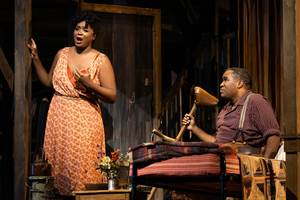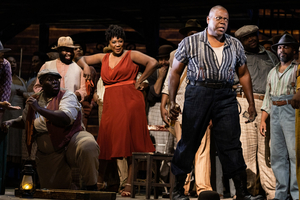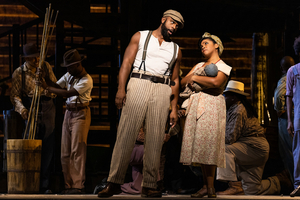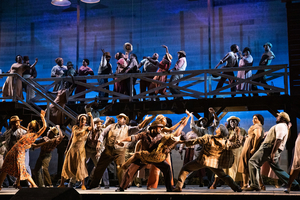Review: Gershwin's PORGY & BESS Returns to the Met with a Grand Bess in Angel Blue
Met singers do honor to the composer’s mighty score

Evan Zimmerman/Met Opera
Gosh! There are so many things to like about the season's revival of Gershwin's PORGY & BESS, which was new in the 2019-2020 season, before Covid became the "song" that no one wanted to hear.
PORGY on the other hand, is the music that everybody can take a liking to, with its fluid combination of opera, Broadway musical and versions of spirituals and Gullah folk music that nobody ever heard before. It has been best known for its songs, which have become "standards" in the Broadway songbook. The stylistic shifts in the complex, yearning, comic score are handled mightily by the Met's game orchestra under David Robinson.
James Baldwin called its libretto (or "book" in Broadway parlance) a white man's version of black life and the opera survives most likely in spite of it rather than because of it. It has become more problematic in current times--though as far back as the '50s the NAACP advised black artists to stay away from it--but perhaps this accounts for the straightforward direction by James Robinson, which seems to lack adventure. (I found that the recent Broadway Diane Paulus version with Audra MacDonald as Bess, while trying to fix some of the book problems, made it so downbeat as to be unappealing.)

Photo: Evan Zimmerman/Met Opera
The Met's production has a grand Bess in soprano Angel Blue, who has shown so many times what an asset she is to the company, including her stellar performance in the season's landmark FIRE SHUT UP IN MY BONES. She gets under the skin of her character, whether in the cheerier moments or as the addicted, addled character who can't quite give up the abusive, but sexy Crown (the wonderful bass-baritone Alfred Walker) for a man she can rely on, the down-to-earth Porgy (Eric Owens, another bass-baritone). When she tells Porgy she loves him, it's easier to know that she sees something in him past the man who can save her from Crown, "Don't let him handle me and drive me mad...."

Photo: Evan Zimmerman/Met Opera
Then there's Ryan Speedo Green (still another bass-baritone), who has become one of the Met's most reliable chameleons, whether so appealing here in PORGY, as family man Jake, or as solid Uncle Paul in FIRE and as the drunken monk Varlaam in the boisterous inn scene of BORIS GODUNOV on the first two nights of the season.
Among the others I really appreciated were tenor Frederick Ballentine's lively Sportin' Life (never did "plenty of nuthin'" seem less true) and mezzo Tichina Vaughn's rock-solid Maria (stepping in for the indisposed Denyce Graves), soprano Latonia Moore (so marvelous in FIRE) as Serena, who gets one of Gershwin's best pieces, "My Man's Gone Now," and soprano Janai Brugger's touching Clara, who sings the showpiece, "Summertime."

Camille Brown's choreography set the piece in motion, sprouting wings--as it also did in FIRE--in a way that I wish the rest of the production by Robinson could have, despite stellar work from the Donald Palumbo's magnificent chorus and orchestra under Robertson.
For me, the problematic aspect was Owens, although he finally seemed to let go a bit as the work reached its conclusion, with him following Bess and Sportin' Life to New York. But most of the time--particularly in the first act--he was just too stolid, even for playing the disabled, straight-backed character who gave hope to the beleaguered Bess. With him at the heart of the production (the novel it was based on was simply called "Porgy"), the rest of James Robinson's work as director was made more difficult, even though the cast worked like the devil to make it do so.
Still, the production--with sets by Michael Yeargan with projections by Luke Hall, costumes by Catherine Zuber and lighting by Donald Holder--is a night worth seeing and, especially, hearing. When the opera first opened on Broadway in 1935, people asked "What is it?", trying to pigeonhole it as opera or Broadway. Whatever it's called, that score by Gershwin certainly can be called one thing: Wonderful!
PORGY & BESS will be performed at the Met through December 12. For more information, see the Met's website.
Reader Reviews
Videos

